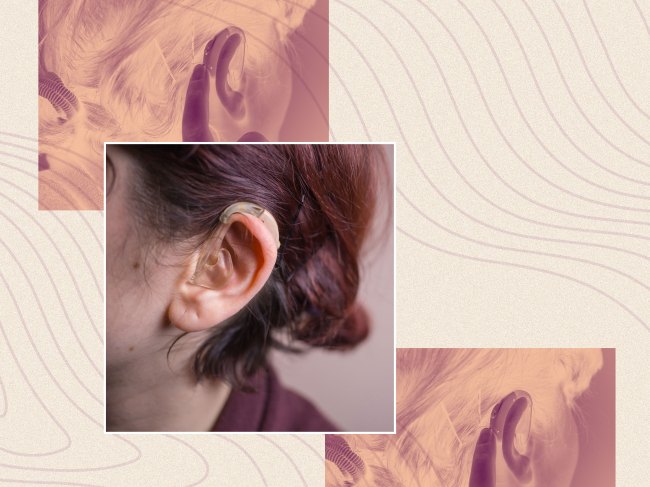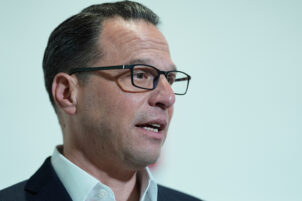Hearing Aids Have Come A Long Way. Here Are 4 Breakthrough Technologies to Know About
In recent years, hearing loss technology has evolved substantially, improving on everything from efficacy to look and feel. Today, you can even swing by your local Apple store and buy AirPods with a built-in hearing aid feature. These are not your grandma’s clunky hearing aids, folks!
Though
ear health
isn’t something many of us tend to think about, it should probably be on your radar. “About 1 in 7 Americans experience some form of hearing loss,”
Dr. Daniel Sun
, an otolaryngologist, surgeon, and professor at the University of Cincinnati’s College of Medicine, tells Flow Space. It’s typically age-related, though it can even come on earlier than you’d think.
At midlife, hearing loss is often linked to
dementia
, a cognitive condition that’s on the rise worldwide. Some forms of dementia, such as Alzheimer’s,
disproportionately affect women
.
Hearing loss is “a risk factor” for dementia, not necessarily the cause of it, “but it’s a much higher one than we previously thought,”
Dr. Sujana S. Chandrasekhar
, an otolaryngologist, surgeon, and partner at ENT & Allergy Associates, tells Flow Space. One
recent study
found that up to 32 percent of dementia cases can be attributed to measurable hearing loss – in other words, early screening and intervention may delay the onset of dementia for a large swath of older adults. Women have a “much higher risk of hearing loss-related cognitive impairment,” Chandrasekhar says, so that’s especially relevant for them.
Otosclerosis is another condition that can lead to hearing loss at midlife. Per
Cleveland Clinic
, it stiffens bones in the ear, compromising sound’s ability to travel. “For reasons we don’t yet fully understand, it tends to occur more commonly in women, especially after one or more pregnancies,” Sun says.
If you’re worried about your hearing at all, Sun and Chandrasekhar recommend consulting with an ear, nose, and throat (ENT) doctor for a
hearing test
. It’s the only way to get properly assessed and treated. You’ll want to get screened early and regularly, especially if you’re 50 or older, says Chandrasekhar. “The highest-known modifiable risk factor for the development of dementia is hearing loss, and people are not able to identify hearing loss on their own.” It also can’t hurt to educate yourself on what new technologies are available in this space.
Over-the-counter hearing aids
In most cases, hearing loss comes on gradually, Sun says. Often, people aren’t even aware that they’re experiencing it until it progresses. It’s one reason to support newer over-the-counter (OTC) technologies like
Apple’s AirPods Pro 2 model
, which feature clinical-grade hearing aids and can measure your hearing capabilities in real time. These relatively inexpensive devices “allow some basic hearing tests to be done at home on our phone and can help us be much more aware of our hearing,” he says.
Chandrasekhar likens OTC hearing aids to readers versus prescription eyeglasses: “They help patients who have mild to moderate hearing loss and can remove the stigma that society places on using hearing technology.” She counsels many of her patients to play around with devices like the AirPods 2.0 as “starter hearing aids” and see where they help.
That comes with some caveats, though. If you have more severe hearing loss, an OTC device like this won’t cut it for you. They’re not a substitute for assessment or treatment from a medical professional. Additionally, if your hearing isn’t the same in both ears, that’s “a red flag” and a sign to consult with an ENT doctor ASAP, Chandrasekhar says.
AI-powered hearing aids
Artificial intelligence is
revolutionizing other areas of medicine
, so it will come as no surprise that it’s also made its mark on hearing loss technology. Multiple popular hearing aid models – such as Starkey’s
Edge AI
, which you can only get with a prescription from your healthcare provider – feature AI integrations that reduce background noise and increase efficacy. Sontro makes a
similar OTC model
that’s more affordable but has fewer functionalities.
The most advanced of these AI-powered devices continually monitor your listening habits and make adjustments in real time based on which frequencies or volume levels you struggle to hear. You can even pair certain models with designated mobile apps, which make it easier to adjust settings, monitor your health data, and stream calls to your device via Bluetooth. (So, no, it’s not your grandma’s hearing aid, but if she can figure out how to text you on a smartphone, then she can figure out how to use it.)
Mobile app-based hearing tests
While not AI-powered,
hearWHO
, a free mobile app from the World Health Organization, is another self-screening tool that Chandrasekhar recommends. If you try it, be sure to conduct the test in a quiet room with good earbuds or headphones. And if the results concern you, “schedule a comprehensive audiology assessment,” she says. “The mobile tests are good at checking pure-tone hearing” – so, beeps – “but they are not good at assessing speech discrimination, which is a vital part of understanding how we hear.”
Cochlear implant technology
A cochlear implant is a surgically implanted device used to improve hearing in people with severe to profound hearing loss. Per
Mayo Clinic
, they’re generally most effective in very young children or adults who could speak and read before losing their hearing. In recent years, this technology has advanced too, says Sun, allowing for “better and earlier hearing restoration after hearing loss starts.”
Traditionally, cochlear implants include an external component that’s visible behind the wearer’s ear. Recently, scientists in Belgium and Germany began conducting trials on a totally implantable cochlear implant (TICI), which would eliminate the device’s external component without compromising its efficacy. It still has a long way to go before it’s available to the general public, but early trial results
look promising
.
The bottom line
It bears repeating: If you’re at all concerned about your hearing, make an appointment with an ENT doctor. “Having our hearing checked is inexpensive, painless, and could add years of healthy brain living to our golden years,” Chandrasekhar says.
More from Flow Space






